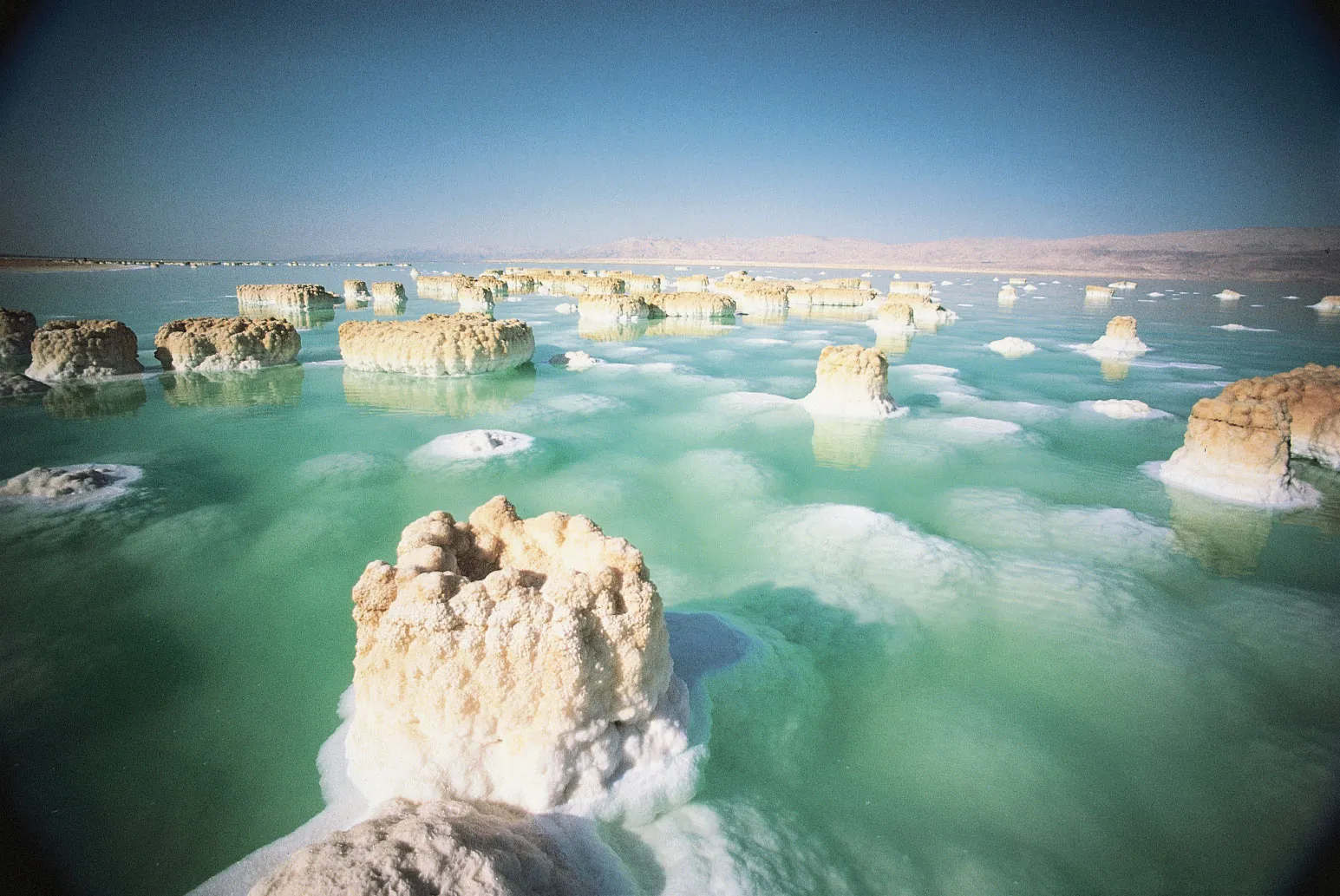Get ready to explore the Dead Sea, a saltwater lake nestled in the Middle East that has been making waves in the history books for centuries. From ancient civilizations to modern-day mysteries, this enigmatic body of water has likely played a starring role in shaping our past. And guess what? Scientists are still uncovering its secrets through cutting-edge research. So, buckle up and join us on a fascinating journey through time, where we’ll dive deep into the Dead Sea’s remarkable story.
Historical Importance of the Dead Sea
The Dead Sea isn’t just a cool name on a map; it’s a place steeped in history, a place that has fascinated people for centuries. Nestled between Jordan and Israel, this saltwater lake is more than just a body of water – it’s a time capsule reflecting ancient civilizations, religious beliefs, and even the very geology of our planet.
One of the things that makes the Dead Sea so intriguing is its reputation as a kind of ancient spa. People have been drawn to its mineral-rich waters and mud for ages, believing in their therapeutic potential. The high salt content, far saltier than any ocean, makes you super buoyant, allowing you to float effortlessly. This is believed to help relax muscles and soothe aches.
But the Dead Sea’s story goes far beyond simple relaxation. It’s intertwined with some of the most famous stories ever told – those found in the Bible. This is where the infamous cities of Sodom and Gomorrah are said to have stood before they were destroyed, a tale that’s given the area an almost mythical quality.
Beyond its religious significance, the Dead Sea was a valuable resource for past societies. The ancient Egyptians, for example, used asphalt from the Dead Sea region in their mummification rituals. The potash found here, a type of salt, was a sought-after fertilizer, helping ancient civilizations boost their agricultural production.
Perhaps the most dramatic chapter in the Dead Sea’s story unfolded with the discovery of the Dead Sea Scrolls. Imagine, tucked away in caves near the lake, these ancient texts lay hidden for centuries, only to be found in the 20th century! These scrolls contained biblical texts and other writings that have revolutionized our understanding of Jewish history and religious practices. They’ve given us glimpses into the lives of people who lived over 2000 years ago, including insights into the time period when Jesus lived.
The Dead Sea’s story is far from over. Ongoing research continues to unearth new discoveries, adding to our knowledge of this unique place. What we do know is that the Dead Sea offers more than meets the eye. It’s a place where history, religion, geology, and human curiosity converge, a salty lake that continues to captivate and intrigue us.
Why was the Dead Sea important to ancient Egypt?
We’ve already talked about how the Dead Sea has been a significant place for a really long time, but what about its importance to the ancient Egyptians? Well, it turns out this mysterious body of water held some pretty valuable secrets for them.
One of the biggest reasons the ancient Egyptians were so interested in the Dead Sea was because of something called bitumen. You might know it better as asphalt – the stuff we use to pave roads! Now, the Dead Sea’s bitumen wasn’t for building roads back then. It was a key ingredient in their mummification process. See, bitumen is waterproof, and the ancient Egyptians believed that preserving the bodies of their deceased was super important for their journey to the afterlife. They used this sticky, tar-like substance to coat the bodies and keep them from decomposing.
But it wasn’t just about the bitumen. People have been drawn to the Dead Sea for ages because of how buoyant and relaxing it is. That’s thanks to its incredibly high salt content. The ancient Egyptians were no different! They, too, likely enjoyed floating in its waters and using its mineral-rich mud for therapeutic purposes.
Beyond the practical uses, the Dead Sea also held a special place in the hearts and minds of the ancient Egyptians. Its mention in ancient religious texts suggests it was a place of spiritual significance as well. It’s incredible to think that a place like the Dead Sea could have played such a multi-faceted role in shaping one of history’s most fascinating civilizations.
What is the History of the Dead Sea According to the Bible?
The Dead Sea’s history, as told by the Bible, is full of intriguing stories. In the book of Genesis, chapter 14, you’ll find the account of Sodom and Gomorrah. These cities, known for their wickedness, were said to have been located near the Dead Sea. Their destruction, likely caused by some natural disaster, is often interpreted as a reminder of divine judgment.
Centuries later, the Dead Sea provided refuge for King David. It’s believed he sought safety amidst its desolate beauty, perhaps even engaging in the profitable salt trade that the region was known for.
The Bible uses several names to refer to the Dead Sea, like the Salt Sea or the Sea of the Arabah. It even calls it the Eastern Sea, hinting at its geographical importance as a border for the Promised Land.
Here’s what we can glean from the biblical accounts:
- Divine Judgment: The story of Sodom and Gomorrah paints a picture of the Dead Sea as a place forever linked to divine intervention and the consequences of straying from a righteous path.
- Royal Refuge: King David’s story adds another layer, showcasing the Dead Sea as a place of refuge and highlighting its economic importance due to its valuable resources.
- A Symbolic Border: The Bible’s use of different names for the Dead Sea, along with its description as a boundary, emphasizes its role as a geographical and symbolic marker in the ancient world.
While we can learn a great deal from the Bible, it’s important to remember that interpretations can vary, and ongoing research continues to shed light on this fascinating historical and religious narrative.
What is the Legend of the Dead Sea?
The Dead Sea, this mysterious lake nestled between Jordan and Israel, isn’t just incredibly salty, it’s practically swimming in stories. Its name, “Dead Sea,” comes from the fact that it’s so salty, nothing can really live in it.
This incredible saltiness isn’t the only thing that makes the Dead Sea special. For centuries, it’s been a place of huge importance for different cultures and religions. It pops up in sacred texts like the Bible, the Torah, and the Quran. For Christians, it’s believed that Jesus himself was baptized in the Jordan River, which eventually flows into the Dead Sea. And in Islamic tradition, the Dead Sea is thought to be one of the places where the final judgment will occur.
But the Dead Sea isn’t just about history and religion; it’s also a place of healing. The mud and water are packed with minerals, and for ages, people have been using them to treat all sorts of things, especially skin conditions. These days, people from all corners of the globe flock to the Dead Sea for a chance to experience these therapeutic benefits firsthand.
Some folks even say the air around the Dead Sea is special, especially for those with breathing problems. The air is thicker with oxygen because of the Dead Sea’s low altitude, which some believe can make breathing easier.
While many of the Dead Sea’s powers are backed up by science – we know that mineral-rich mud can do wonders for your skin – some of the stories surrounding it are more like local legends, passed down through generations.
One such legend claims that the Dead Sea was once a bustling city that angered God, who then flooded the city, leaving behind the salty lake we see today. It’s a story that’s been told and retold, adding an extra layer of intrigue to this already fascinating place.
So, while scientists continue to unravel the mysteries of the Dead Sea, one thing is certain: it’s a place where science and stories collide, where history, religion, and natural wonders all come together to create something truly extraordinary.
What are the important points about the Dead Sea?
The Dead Sea, nestled between Israel and Jordan, isn’t just any ordinary lake. It’s like a giant natural spa with a history that goes way back. People have been fascinated by this wonder of nature for ages, and it’s easy to see why. With stories from ancient times, unique qualities you won’t find elsewhere, and scientists constantly making new discoveries, the Dead Sea never gets old!
Ancient Tales and Holy Mentions
This lake is steeped in history and religion. The Bible, for instance, tells of King David finding safety here and even trading salt from its shores. Then, there’s the incredible discovery of the Dead Sea Scrolls – ancient religious writings hidden away in caves near the lake, giving us a glimpse into Jewish history and beliefs from long ago.
One of a Kind
Firstly, the Dead Sea is officially the lowest point on the planet – a whopping 423 meters below sea level! Secondly, it’s so salty—around 34%—that no fish or plants can survive there. This extreme saltiness also makes you super buoyant. You can literally just lie back and float effortlessly.
Under the Microscope
Scientists are obsessed with the Dead Sea, and it’s no wonder. Its unique environment is a goldmine for research. They’re constantly studying its geology, its ecosystem, and its potential health benefits. It seems those minerals and mud everyone’s been raving about might actually have healing powers.
Just to Recap:
- Ancient importance: The Dead Sea pops up in biblical stories about Sodom and Gomorrah, King David, and, of course, the famous Dead Sea Scrolls.
- Totally Unique: Where else can you float effortlessly thanks to super salty water? Plus, the mud and minerals here are thought to be therapeutic.
- Science Hotspot: Scientists are still uncovering the mysteries of the Dead Sea, from its geology to its potential health perks.
Learn More:
This is just the tip of the iceberg when it comes to the Dead Sea. If you’re curious to learn more, check out this article from National Geographic: The Dead Sea: A Natural and Historical Wonder
Why is the Dead Sea important to history?
The Dead Sea, a place steeped in history and religion, has captivated people for centuries. Let’s explore why this unique body of water holds such a significant place in our collective memory.
Echoes of Ancient Civilizations
The Dead Sea is woven into some of the most famous stories from the Bible, including the tale of Sodom and Gomorrah. It’s a place where history and legend intertwine. Long ago, people recognized the value of its abundant salt and minerals, not just for seasoning food, but for trade as well. These resources helped shape the economic development of entire civilizations.
Unlocking Secrets of the Past
The discovery of the Dead Sea Scrolls is one of the most remarkable events associated with this body of water. These scrolls, dating back centuries, offer a glimpse into the religious practices and beliefs of Jewish communities in the past. Their discovery has profoundly impacted our understanding of early Judaism and the development of Christianity.
The Dead Sea wasn’t just a site of ancient industry and scholarship; it was also a place of pilgrimage. For centuries, people have journeyed to its shores seeking spiritual connection and the healing properties of its mineral-rich mud and water.
A Delicate Balance: Nature’s Wonders
You might think that nothing could survive in the incredibly salty waters of the Dead Sea, but a fascinating ecosystem of salt-tolerant microorganisms thrives there. These tiny creatures are a testament to the adaptability of life and provide scientists with invaluable insights into how organisms survive in extreme environments.
Unveiling the Past, Piece by Piece
As archaeologists continue to explore the region surrounding the Dead Sea, they uncover more clues about its past. Every artifact unearthed, every ancient settlement discovered, adds a new layer to our understanding of the people who lived and interacted with this unique environment thousands of years ago. The Dead Sea region is like a giant jigsaw puzzle, and with every new discovery, we get a little closer to completing the picture of its captivating history.
It’s important to remember that our understanding of the Dead Sea and its historical significance is constantly evolving. New discoveries are being made all the time, and ongoing research continues to shed light on the mysteries of this incredible place.
What is the natural significance of the Dead Sea?
The Dead Sea is not just a historical marvel; it’s also a natural wonder with immense significance.
A Geological Marvel
The Dead Sea sits about 423 meters below sea level, nestled in a rift valley formed by shifting tectonic plates, making it the lowest point on Earth. This unique position has shaped the dramatic landscape we see today, with towering cliffs and sparkling salt formations.
A Unique Ecosystem
The Dead Sea is often called “dead” because of its incredibly high salt content – ten times saltier than the ocean! It’s so salty that most plants and animals simply can’t survive there. However, the Dead Sea is actually teeming with tiny but mighty organisms – bacteria and microorganisms – that have adapted to thrive in this extreme environment. Studying these resilient creatures can teach us a lot about the limits of life itself.
A Therapeutic Oasis
For centuries, people have flocked to the Dead Sea for its healing powers. The mud and water are packed with minerals like magnesium, potassium, and calcium, which are believed to work wonders for various skin conditions. Many people find relief from aches and pains after a good soak. While more research is always being done, the Dead Sea’s reputation as a therapeutic oasis is well-deserved.
Beyond the Surface
Ongoing research is constantly uncovering new secrets about the Dead Sea’s geology, its unique ecosystem, and its potential for new medical treatments. The Dead Sea is a powerful reminder that even in the harshest environments, life finds a way, and that our planet holds endless mysteries waiting to be discovered.
How did the sea help ancient Egypt?
While the Nile River was the lifeblood of ancient Egypt, the seas also played a crucial role in their development, particularly the Mediterranean Sea and the Red Sea. These watery highways were essential for trade, connecting Egypt to the rest of the ancient world.
Egypt was known for its agriculture, but they couldn’t grow everything. The sea allowed them to sail to different lands and obtain goods they couldn’t produce themselves, such as spices and wood from distant forests. This trade brought wealth and power to Egypt, and the sea was their bridge to these riches.
The ancient Egyptians were also skilled shipbuilders, crafting impressive vessels from wood and papyrus. These ships, capable of handling long voyages and carrying tons of cargo, were essential for both trade and naval power. While we don’t have photographs of these ships, archaeological discoveries of paintings and vessel remains provide clues about how advanced their shipbuilding techniques were.
Why is the Dead Sea Valuable?
The Dead Sea is more than just a salty lake; it’s a place of historical treasures, healing waters, and scientific intrigue.
Digging into History: More Than Just Old Scrolls
The Dead Sea Scrolls, those ancient writings discovered in caves near the Dead Sea, provide invaluable insights into Jewish history and religious practices. They offer a window into the world as it was centuries ago, and are helping researchers understand how Christianity and the Old Testament came to be.
The Dead Sea’s historical significance extends beyond the Scrolls. This location, mentioned in the Bible as the site where Sodom and Gomorrah were destroyed, holds religious importance for many.
Feeling Good: The Science of Soaking
The Dead Sea is renowned for its healing powers. The water, packed with minerals, and the therapeutic mud have been used for centuries to treat skin problems and promote overall well-being.
The high salt content of the Dead Sea makes it incredibly buoyant, allowing people to float effortlessly on its surface. This unique experience, along with the mineral-rich water and mud, makes the Dead Sea a natural spa.
Good for the Body, Good for Business
The minerals found in the Dead Sea, such as potash and bromine, are valuable resources extracted for industrial use. Tourism is another significant economic driver, with people from around the world visiting the Dead Sea to experience its unique healing properties and stunning landscapes.
A Living Laboratory: Unlocking Nature’s Secrets
Scientists are drawn to the Dead Sea’s extreme environment. The high salinity, unique geological formations, and microorganisms that thrive in this harsh environment provide opportunities to study how life adapts to extreme conditions. Research on the Dead Sea could potentially lead to new medicines and skincare treatments.
The Takeaway: A Lake Like No Other
The Dead Sea is a historical treasure chest, a natural spa, an economic powerhouse, and a scientific marvel all rolled into one. It’s a place that continues to captivate and intrigue us, a reminder of the incredible power and mystery of the natural world.
Why was death so important in ancient Egypt?
For the ancient Egyptians, death was not an end but a transition to another life. Their belief in the afterlife was deeply ingrained in their culture and influenced every aspect of their lives, particularly their funerary practices.
The Egyptians believed that by carefully preserving the body and equipping it for the journey, the deceased could reach a happy afterlife and reconnect with loved ones who had passed on before. They built magnificent tombs, adorned with intricate paintings and filled with everyday objects, to provide comfort and familiarity in the afterlife.
Mummification, a complex process of drying, wrapping, and preserving the body, was essential to their beliefs. They saw these mummies not as morbid curiosities but as vessels meant to carry the spirit into eternity.
The Egyptians also placed great importance on providing spiritual guidance for the deceased. They developed elaborate funerary rituals, filled with prayers, offerings, and magical spells, all designed to ease the soul’s transition to the afterlife. The ‘Book of the Dead,’ a collection of spells and instructions, was often buried with the deceased to guide them through the underworld.
Some scholars believe that the Egyptians’ focus on the afterlife stemmed from their relationship with the Nile River. The river’s annual floods, followed by periods of rebirth and renewal, may have inspired their beliefs in resurrection and eternal life.
While much remains to be discovered about ancient Egypt, their profound reverence for death provides a glimpse into their worldview, reminding us that different cultures have approached life’s greatest mystery in vastly different ways.
What are the hidden benefits of the Dead Sea?
The Dead Sea is renowned for its therapeutic benefits, offering a unique combination of mineral-rich waters, therapeutic mud, and a rejuvenating environment.
Your Skin’s New Best Friend
The Dead Sea’s water is rich in minerals like magnesium, potassium, and calcium, which are known for their soothing and rejuvenating effects on the skin. These minerals can help reduce redness and irritation, promote skin regeneration, and leave your skin feeling refreshed. The high levels of bromide in the water also act as a natural relaxer, which can contribute to better sleep.
Breathe Deep, Relax Deeper
The air around the Dead Sea is incredibly clean and rich in oxygen due to its low altitude. This oxygen-rich environment can improve lung function and make it easier to breathe, especially for those with respiratory issues. Combined with the naturally calming atmosphere, the Dead Sea offers a truly relaxing experience.
Joint Pain? Mud to the Rescue!
Dead Sea mud, rich in sulfur and other minerals, is a natural pain reliever, particularly for joint pain. These minerals penetrate the skin, increasing blood flow to affected areas and easing pain and inflammation. Some research even suggests that Dead Sea mud may have cardiovascular benefits, potentially improving circulation by widening blood vessels.
Important Things to Remember:
- The Dead Sea’s unique blend of minerals is like therapy for your skin and your mind.
- The air is so clean and oxygen-rich, it’s basically a lung-boosting spa treatment.
- Dead Sea mud is nature’s answer to joint pain relief (and might even give your heart a healthy boost!).
Immerse yourself in the extraordinary realm of the Dead Sea. Dive into the fascinating world of its enigmatic waters and unveil 10 amazing facts that will leave you spellbound. Click to explore 10 amazing facts about the Dead Sea.
Transform your skincare routine with the astonishing benefits of Dead Sea minerals. Discover the secrets to rejuvenating and revitalizing your skin. Click to learn about Dead Sea mineral benefits for skin and embark on a journey to a healthier, radiant complexion.
- China II Review: Delicious Food & Speedy Service - April 17, 2025
- Understand Virginia’s Flag: History & Debate - April 17, 2025
- Explore Long Island’s Map: Unique Regions & Insights - April 17, 2025
















